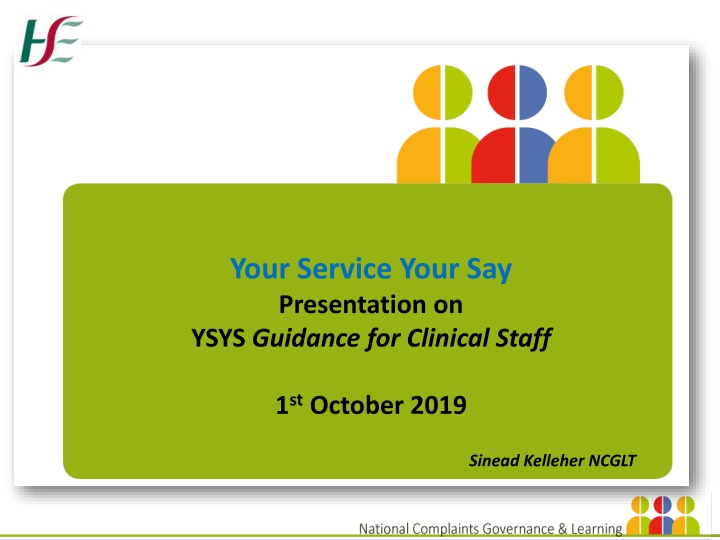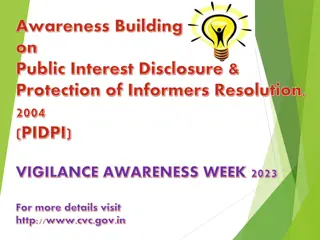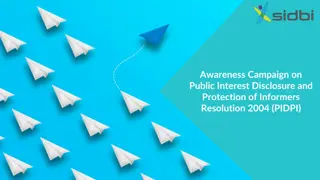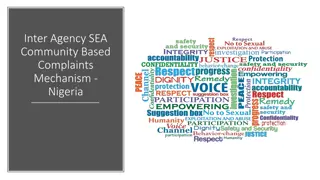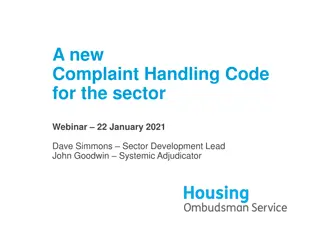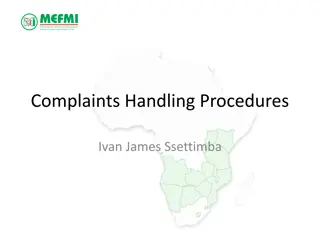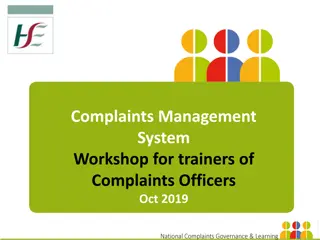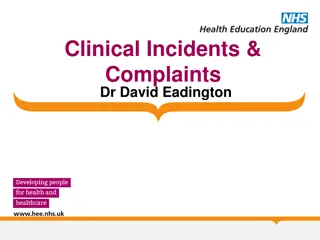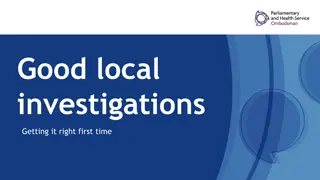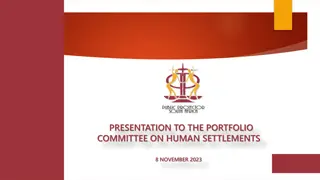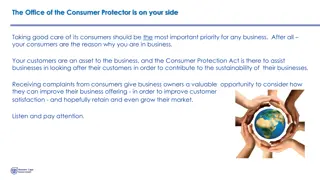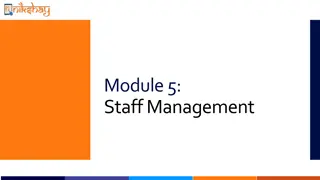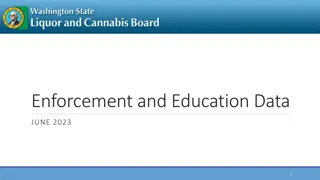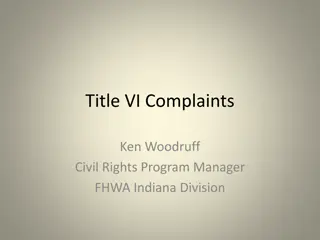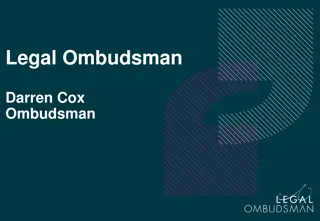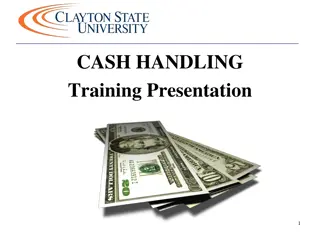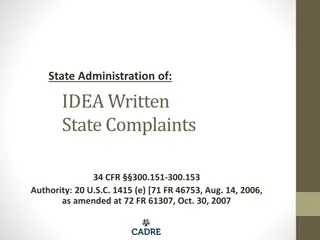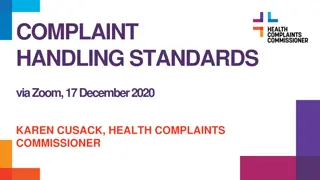Comprehensive Guidance for Clinical Staff on Complaints Handling Process
Developed for clinical professionals, this guidance provides support for participating in complaints investigations and writing clinical reports. It aims to clarify the definition of clinical judgment and outlines the key elements of handling complaints effectively. The module encourages collaborative work with Complaints Officers, effective communication with Service Users, and the importance of learning from complaints for personal and organizational development.
Download Presentation

Please find below an Image/Link to download the presentation.
The content on the website is provided AS IS for your information and personal use only. It may not be sold, licensed, or shared on other websites without obtaining consent from the author.If you encounter any issues during the download, it is possible that the publisher has removed the file from their server.
You are allowed to download the files provided on this website for personal or commercial use, subject to the condition that they are used lawfully. All files are the property of their respective owners.
The content on the website is provided AS IS for your information and personal use only. It may not be sold, licensed, or shared on other websites without obtaining consent from the author.
E N D
Presentation Transcript
Your Service Your Say Presentation on YSYS Guidance for Clinical Staff 1stOctober 2019 Sinead Kelleher NCGLT
Why has this been developed? This guidance has been developed to provide support to the various clinical professionals who may at some point be asked to contribute their views as part of a complaints investigation or to write a specific clinical report as part of the complaints investigation.
The Health Act 2004 defines clinical judgment as being: A decision made or opinion formed in connection with the diagnosis, care or treatment of a patient NOTE: Clinical judgment can be exercised by any of the recognised clinical professions, including Doctors, Nurses, Midwives, Dentists, Pharmacists, Optometrists, Clinical Psychologists, Ophthalmic Medical Practitioners, Allied Health Professionals, Emergency Medical Technicians, Laboratory, Environmental Health Officers, other scientific and technical staff.
Your Service Your Say: Complaints Handling Guidance for Clinical Staff
YSYS Complaints Handling Guidance for Clinical Staff AIM: This module will guide you through your involvement in the Your Service Your Say complaints process, encourage and assist you to engage with Service Users and outline the key elements of a Clinical Judgement Complaint Report. National Complaints Governance & Learning Team
National Complaints Governance & Learning Team Purpose Outcomes: By the end of the course you will be able to: Fulfil your role in the Your Service Your Say complaints handling process, and describe your responsibilities within the legislative framework. Work collaboratively with the Complaints Officer to effectively resolve complaints. Communicate effectively with Service Users to respond appropriately to their concerns. Write a clear clinical judgement complaint report in line with best practice to demonstrate to Service Users that their complaint has been heard and taken seriously. Identify where complaints offer opportunities for learning, for yourself, your team and your organisation.
National Complaints Governance & Learning Team Content Topic Title Approximate Duration TOPIC 1 Setting the Scene 15 minutes TOPIC 2 Undertaking Informal Resolution 20 minutes TOPIC 3 Contributing to or conducting a Formal Investigation 15 minutes TOPIC 4 Summary and Assessment 10 minutes
Setting the Scene Overview of the 4 stages of the complaints Description of assessing a complaint and what is described as clinical elements within a complaint and non-clinical elements. The role of Clinical staff in the complaints management process. How Complaints Officers (CO) & clinical staff work together? Overview of Informally investigating a complaint Overview of the formal investigation phase: Clinical professional investigates CJI, writes Clinical Judgement Complaint Report & provides it to CO. National Complaints Governance & Learning
Setting the Scene Setting the scene will incorporate a number of animations addressing the various types of concerns that a clinical professional may encounter before agreeing to meet a complainant: This section is about addressing any fears and concerns clinical staff may have about being involved in informal resolution. Learners will be presented reassuring messaging about how this module will prepare them to meet these challenges. E.g. This module is giving you a structure to make this engagement easier. It will help you with communication skills and resilience. Complaints are an opportunity for learning and improvement. Service users need to feel trust and confidence. National Complaints Governance & Learning
Setting the Scene This module will show you how to effectively engage with complainants. For face to face and telephone conversations, you can use the ASSIST model. A: ACKNOWLEDGE, S: SORRY, S: STORY, I: INQUIRE, S: SOLUTIONS, T: TRAVEL A: ACKNOWLEDGE: Consider in advance: What do you need to acknowledge to the service user? S: SORRY: Consider: What do you need to say sorry for? S: STORY: Provide an opportunity for the patient/service user/family to relate to you their understanding of what has happened including the impact the event has had on the and their feelings/concerns in relation to the event and their ongoing condition and care plan. I: INQUIRE: Provide an opportunity for the patient/service user/family to ask questions. S: SOLUTIONS: Seek the patient/service user/family s ideas on the way forward. T: TRAVEL: Avoid abandonment Reassure them that their care going forward will not be compromised. National Complaints Governance & Learning
Topic 2: Undertaking Informal Resolution It could be resolved informally by meeting and discussing with the complainant, which could happen in person or over the phone. Meeting = opportunity for complainant to voice concerns and explain issues more clearly; forum to discuss issues; it may be possible to resolve some/all complaint issues. Why Meet the Service User? Written complaint doesn t mean you cannot try to resolve informally. Possible outcomes are discussed in this topic: Some or no YSYS resolved & some or no CJI resolved All YSYS resolved & no CJI resolved All YSYS resolved & all CJI resolved National Complaints Governance & Learning
A Complaint is Made SCENARIO 1: Consultant, acute setting National Complaints Governance & Learning
Preparing to meet the Complainant Best practice preparation through interactive questioning and considerations. This meeting is set on an interactive learning platform through the use of videoing a meeting in an acute setting with the different characters. Best practice methods are highlighted here and the learners must decide on what the best practice approach is from a multiple choice. National Complaints Governance & Learning
A Complaint is Made Scenario 2: Physiotherapist Community Setting National Complaints Governance & Learning
Topic 3: Contributing to a Formal Investigation In some situations, complaints are not resolved informally & complainant may want a formal investigation from the outset. Overview of formal investigation steps for clinical staff: Clinical professional: Receives notification letter from Complaints Officer, requesting Clinical Judgement Complaint Report Investigates Clinical Issues & updates Complaints Officer if more time needed. Writes & signs a Clinical Judgement Complaint Report. Provides report to Complaints Officer. National Complaints Governance & Learning
Topic 3: Contributing to a Formal Investigation Writing a Clinical Judgement Complaint Report (CJCR) This section will also include a video interview from a real consultant who hascompleted reports, and how they have found the process. Clinical Judgment report structure Do s & Don t in writing a report Example s of a well written report Example s of a poorly written report Identified learning. National Complaints Governance & Learning
Assessment Assessment at the end 5 questions Must get 80% to pass. National Complaints Governance & Learning
